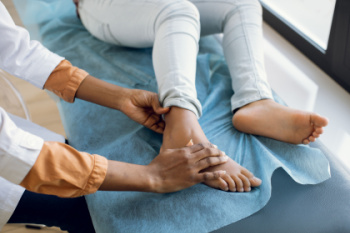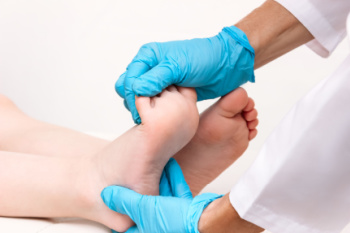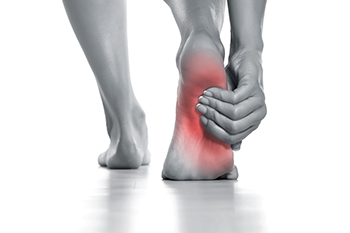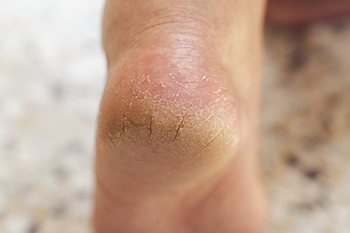Items filtered by date: March 2024
Common Reasons to Have Foot Pain

Foot pain is a prevalent complaint that can disrupt daily activities and diminish quality of life. Several factors contribute to this discomfort, ranging from overuse injuries to underlying medical conditions. One common cause of foot pain is plantar fasciitis, which occurs when the band of tissue supporting the arch of the foot becomes inflamed due to excessive strain or stress. Similarly, Achilles tendonitis, characterized by inflammation of the Achilles tendon at the back of the heel, often results from overuse or improper footwear. Bunions, structural abnormalities of the foot, and ingrown toenails can also cause significant discomfort and pain. Additionally, conditions such as arthritis, diabetes, and neuropathy may manifest as foot pain. Seeking medical advice from a podiatrist is vital for an accurate diagnosis and appropriate treatment to alleviate foot pain and prevent further complications. If you have developed foot pain, it is suggested that you are under the care of this type of doctor who can provide an accurate diagnosis and offer correct treatment options.
Foot Pain
Foot pain can be extremely painful and debilitating. If you have a foot pain, consult with Peter Siroka, DPM from Connecticut. Our doctor will assess your condition and provide you with quality foot and ankle treatment.
Causes
Foot pain is a very broad condition that could be caused by one or more ailments. The most common include:
- Bunions
- Hammertoes
- Plantar Fasciitis
- Bone Spurs
- Corns
- Tarsal Tunnel Syndrome
- Ingrown Toenails
- Arthritis (such as Gout, Rheumatoid, and Osteoarthritis)
- Flat Feet
- Injury (from stress fractures, broken toe, foot, ankle, Achilles tendon ruptures, and sprains)
- And more
Diagnosis
To figure out the cause of foot pain, podiatrists utilize several different methods. This can range from simple visual inspections and sensation tests to X-rays and MRI scans. Prior medical history, family medical history, and any recent physical traumatic events will all be taken into consideration for a proper diagnosis.
Treatment
Treatment depends upon the cause of the foot pain. Whether it is resting, staying off the foot, or having surgery; podiatrists have a number of treatment options available for foot pain.
If you have any questions, please feel free to contact our office located in Stamford, CT . We offer the newest diagnostic and treatment technologies for all your foot care needs.
Insights into Children's Foot Development

During infancy, a child's feet are pliable and mostly made of cartilage, gradually ossifying into bones over time. Until the age of six, children's feet are still forming, with the arches gradually developing. It is normal for children to have flat feet during this period, as the arches develop and muscles strengthen. Additionally, children's feet grow rapidly, often requiring new shoes every few months during growth spurts. As they become more active, ensuring proper footwear fit is essential to support their growing feet and prevent discomfort or injury. Children's feet may appear pigeon-toed or have other gait abnormalities as they learn to walk and run. Most of these issues resolve on their own as they develop coordination and muscle strength. Regular monitoring of children's foot health and providing adequate support through appropriate footwear can contribute to their overall well-being and comfort. If you have questions or concerns about your child’s feet, it is suggested that you contact a podiatrist who can provide you with the information you are seeking.
Making sure that your children maintain good foot health is very important as they grow. If you have any questions, contact Peter Siroka, DPM of Connecticut. Our doctor can provide the care you need to keep you pain-free and on your feet.
Keeping Children's Feet Healthy
Having healthy feet during childhood can help prevent medical problems later in life, namely in the back and legs. As children grow, their feet require different types of care. Here are some things to consider...
Although babies do not walk yet, it is still very important to take care of their feet.
Avoid putting tight shoes or socks on his or her feet.
Allow the baby to stretch and kick his or her feet to feel comfortable.
As a toddler, kids are now on the move and begin to develop differently. At this age, toddlers are getting a feel for walking, so don’t be alarmed if your toddler is unsteady or ‘walks funny’.
As your child gets older, it is important to teach them how to take care of their feet.
Show them proper hygiene to prevent infections such as fungus.
Be watchful for any pain or injury.
Have all injuries checked by a doctor as soon as possible.
Comfortable, protective shoes should always be worn, especially at play.
If you have any questions please feel free to contact our office located in Stamford, CT . We offer the newest diagnostic and treatment technologies for all your foot and ankle needs.
Keep Your Feet Healthy So You Can Stay Active
What Can Cause Heel Pain?

Heel pain, a common complaint among individuals of all ages, can significantly impact daily activities and quality of life. One common reason is plantar fasciitis, an inflammation of the thick band of tissue that runs across the bottom of the foot, often resulting from overuse or strain. Another prevalent cause is heel spurs, which are bony protrusions that develop on the underside of the heel bone due to repetitive stress or biomechanical issues. Achilles tendonitis, characterized by inflammation of the Achilles tendon at the back of the heel, is another frequent source of heel pain, often stemming from overuse or wearing improper footwear. Other factors contributing to heel pain can include stress fractures, arthritis, nerve irritation, and heel bursitis. Identifying the underlying cause of heel pain through thorough evaluation and diagnostic testing is vital for developing an appropriate treatment plan tailored to address the specific issue and alleviate discomfort effectively. If you have heel pain, it is strongly suggested that you are under the care of a podiatrist who can determine what the cause is, and guide you toward appropriate treatment options.
Many people suffer from bouts of heel pain. For more information, contact Peter Siroka, DPM of Connecticut. Our doctor can provide the care you need to keep you pain-free and on your feet.
Causes of Heel Pain
Heel pain is often associated with plantar fasciitis. The plantar fascia is a band of tissues that extends along the bottom of the foot. A rip or tear in this ligament can cause inflammation of the tissue.
Achilles tendonitis is another cause of heel pain. Inflammation of the Achilles tendon will cause pain from fractures and muscle tearing. Lack of flexibility is also another symptom.
Heel spurs are another cause of pain. When the tissues of the plantar fascia undergo a great deal of stress, it can lead to ligament separation from the heel bone, causing heel spurs.
Why Might Heel Pain Occur?
- Wearing ill-fitting shoes
- Wearing non-supportive shoes
- Weight change
- Excessive running
Treatments
Heel pain should be treated as soon as possible for immediate results. Keeping your feet in a stress-free environment will help. If you suffer from Achilles tendonitis or plantar fasciitis, applying ice will reduce the swelling. Stretching before an exercise like running will help the muscles. Using all these tips will help make heel pain a condition of the past.
If you have any questions please contact our office located in Stamford, CT . We offer the newest diagnostic and treatment technologies for all your foot and ankle needs.
Is There a Link Between Diabetes and Cracked Heels?

Cracked heels, a common foot ailment, can be particularly concerning for individuals with diabetes. Diabetes can lead to poor circulation and nerve damage, reducing the skin's ability to stay moisturized and heal properly. As a result, the skin around the heels becomes dry and thickened, prone to cracking and fissures. Cracked heels provide entry points for bacteria, increasing the risk of infection, particularly for those with compromised immune systems. Diabetic neuropathy can also diminish sensation in the feet, making it challenging to detect and address foot problems promptly. Left untreated, cracked heels can progress to serious complications such as foot ulcers, infections, and amputation in severe cases. There are essential foot care tips that can help to prevent cracked heels. If you have developed this condition, it is suggested that you seek guidance from a podiatrist who can help you manage diabetes-related foot issues and minimize the risk of complications.
Cracked heels are unsightly and can cause further damage to your shoes and feet. If you have any concerns, contact Peter Siroka, DPM from Connecticut. Our doctor can provide the care you need to keep you pain-free and on your feet.
Cracked Heels
Cracked heels appear unappealing and can make it harder for you walk around in sandals. Aside from looking unpleasant, cracked heels can also tear stockings, socks, and wear out your shoes. There are several methods to help restore a cracked heel and prevent further damage.
How Do You Get Them?
Dry skin is the number one culprit in creating cracked heels. Many athletes, walkers, joggers, and even swimmers suffer from cracked heels. Age and skin oil production play a role to getting cracked heels as well.
Promote Healing
Over the counter medicines can help, especially for those that need instant relief or who suffer from chronic dry feet.
Wear Socks – Wearing socks with medicated creams helps lock in moisture.
Moisturizers – Applying both day and night will help alleviate dryness which causes cracking.
Pumice Stones – These exfoliate and remove dead skin, which allows for smoother moisturizer application and better absorption into the skin.
Change in Diet
Eating healthy with a well-balanced diet will give the skin a fresh and radiant look. Your body responds to the kinds of food you ingest. Omega-3 fatty acids and zinc supplements can also revitalize skin tissue.
Most importantly, seek professional help if unsure how to proceed in treating cracked heels. A podiatrist will help you with any questions or information needed.
If you have any questions, please feel free to contact our office located in Stamford, CT . We offer the newest diagnostic and treatment technologies for all your foot care needs.

